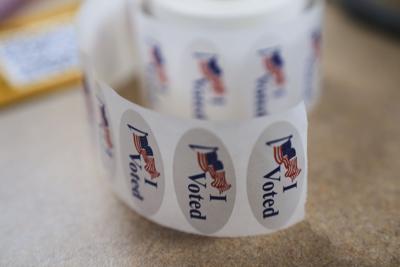NEW YORK — President Donald Trump's request to add a documentary proof of citizenship requirement to the federal voter registration form cannot be enforced, a federal judge ruled Friday.
People are also reading…

Labels reading "I Voted" are seen at the Orange County Registrar of Voters office in Santa Ana, Calif., on Wednesday, Oct. 29, 2025. (AP Photo/Damian Dovarganes)
Job satisfaction among election administrators continues to sink, survey shows
Job satisfaction among election administrators continues to sink, survey shows

The vast majority of America's local election administrators would not encourage their children to do the same job, and a shrinking share of them say they would be proud to tell others about their work, reports.
The findings come from a survey conducted every federal election year by the Elections & Voting Information Center, an academic research group. While it contains small bright spots—election administrators largely find the job personally rewarding, for example—the number willing to encourage their children to follow in their footsteps has decreased by nearly half in the past two election cycles. In 2020, 41% said they would do so. In 2024, that number dropped to 22%.
The survey was fielded from early August to late October.
The negative outlook on election work continues a trend researchers say they began observing in 2020, when increasing scrutiny, threats, and misinformation fanned by supporters of President Donald Trump began reshaping the profession. Public confidence in elections hit new highs after the November 2024 presidential election—which had a clear outcome despite narrow margins—but election administrators are still pessimistic.
"There are still a lot of cracks in the system, and if things had been closer we would have seen a different reaction," said Paul Manson, EVIC research director and research assistant professor at Portland State University in Oregon. "Job satisfaction hasn't gone up—underneath the hood, the people who run elections are still nervous."
Many election administrators and experts believe the public's increased confidence in elections is fragile, and would look different if Trump had lost again, if the election had been closer, or if the results had been contested as they were in 2020. After a grueling few years, the survey found, the administrators remain on edge, a finding that could affect whether communities around the country can find qualified candidates for critical election administration positions.

Finding the Right People for Election Work Is Difficult

Still, across the board, election administrators say that hiring qualified, full time staff is difficult. As Gronke and Manson have done follow-up interviews with some of the respondents, they learned that low pay, high stress, and intense scrutiny were the barriers.
"We had one election official say they couldn't compete with In-N-Out Burger on pay," said Manson. "Administrators want to communicate that this is a long term job with good benefits, but so are other county jobs. And they do not come with as much scrutiny or criticism."
Critically, more than 40% of election administrators say that job applicants have little to no experience in elections, and more than a quarter say that applicants lack the practical skills to do the work. That isn't surprising in such a niche sector.
"Nobody goes to election school. Nobody says, when they are in high school, 'Oh, when I graduate, I want to go here and study to be an election administrator,'" he said. "It's more about having the right skills, and then the job comes up."
Garcia said that people with experience in event planning or who have run a business tend to have transferable skills. In his previous job, in neighboring Tarrant County, his deputy elections administrator was a former Marine.
"You can learn the business if you have the right skills," he said. The problem, though, is that the number of necessary skills continues to expand. "We joke. Like, you have to be a lawyer, an IT person, a spokesperson, a negotiator, and an event planner."
In recent years, the availability of training has improved. The University of Minnesota's Humphrey School of Public Policy—where Choate teaches—offers a certificate in election administration, for example. Choate hopes the industry will start proactively reaching out to more people to attract them to these programs and to the field itself.
Choate said the EVIC report (and others like it) "demonstrate the need for an aggressive program to create education opportunities for young people, people in college and people trying to get into a second career … that set them up for success in the world of election administration."
Why Medium-Size Jurisdictions Struggle

Manson said one thing that stands out to him every year is the struggle medium-size counties experience. "Small counties don't have that many ballots, and large counties have far more resources," said Manson. They can usually muscle through, he said.
But for the medium-size, often suburban counties, "it's like reverse Goldilocks," he said. Demands are growing as population grows, but resources aren't necessarily coming in as fast: The buildings are frequently too small, and there is almost never enough staff.
A few markers have been consistent since EVIC began the survey in 2018. Most notably, the demographics of full time staff. Eighty-eight percent say that they are white, far higher than in the population at large. This number is consistent across jurisdiction size. Just under 85% of respondents to the survey were women (though this number is significantly smaller—just under 50%—for larger jurisdictions).
Gronke and Manson say the job of clerk has historically been popular among women, because it used to be a quiet job that allowed you to balance the demands of family and work. The nature of the work is also viewed through a gendered lens. Kono said she and other clerks are often treated "just as the secretary, or just the person who takes the minutes."
"Yeah, I wish I just took the minutes," she said. "That is the easiest part of the job."
was produced by and reviewed and distributed by Stacker.

















